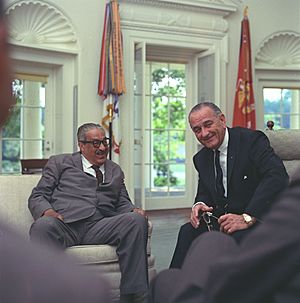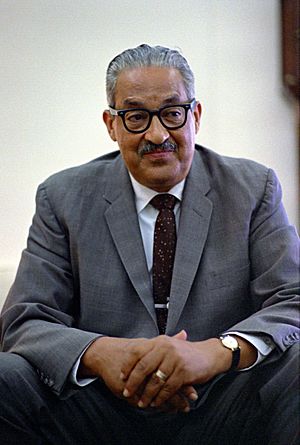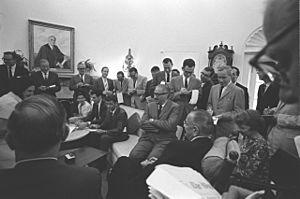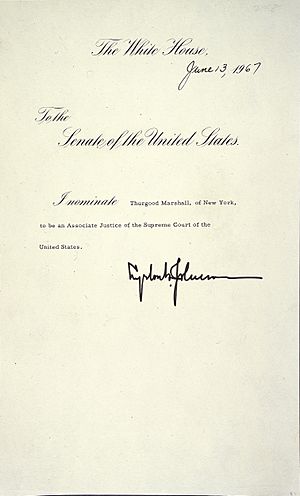Thurgood Marshall Supreme Court nomination facts for kids
Quick facts for kids Thurgood Marshall Supreme Court nomination |
|
|---|---|

Marshall (left) and President Johnson meet in the Oval Office of the White House on June 13, 1967 before the announcement of the nomination
|
|
| Nominee | Thurgood Marshall |
| Nominated by | Lyndon B. Johnson (president of the United States) |
| Succeeding | Tom C. Clark (associate justice) |
| Date nominated | June 13, 1967 |
| Date confirmed | August 30, 1967 |
| Outcome | Confirmed by the U.S. Senate |
| Senate Judiciary Committee vote | |
| Votes in favor | 11 |
| Votes against | 5 |
| Result | Reported favorably |
| Senate confirmation vote | |
| Votes in favor | 69 |
| Votes against | 11 |
| Not voting | 20 |
| Result | Confirmed |
In 1967, Thurgood Marshall was chosen by U.S. President Lyndon B. Johnson to become a judge on the Supreme Court of the United States. This happened on June 13, 1967. Marshall was nominated to take the place of Justice Tom C. Clark, who was leaving the Court.
The Constitution of the United States says that the United States Senate must approve or reject anyone the President nominates for the Supreme Court. This process is called "advice and consent." On August 30, 1967, the Senate voted 69 to 11 to approve Marshall. This made him the first African American person to serve on the Supreme Court. He was also the first justice who was not white.
Some people in the Senate did not want Marshall to be a justice. They said their reasons were not about race. However, many people who supported racial segregation were against his nomination.
Contents
Why Thurgood Marshall Was Nominated
A Supreme Court Opening

In February 1967, President Johnson chose Ramsey Clark to be the Attorney General. Ramsey Clark's father was Tom C. Clark, a judge on the Supreme Court. Tom Clark worried that his son's new job would create a conflict of interest for him. So, he decided to leave the Supreme Court. This created an open spot for a new judge.
This was President Johnson's second chance to pick a Supreme Court judge. He had already chosen Abe Fortas in 1965. No person of color had ever been a Supreme Court judge before. President Johnson wanted to make a lasting impact on civil rights. He believed that picking a non-white judge was the clear and right choice.
Marshall's Strong Background
Thurgood Marshall had a very impressive career. He had won 29 out of 32 cases he argued before the Supreme Court. He was a leading lawyer for the NAACP. From 1938 to 1961, he was their chief lawyer. He worked on very important civil rights cases, like Brown v. Board of Education. This case ended segregation in public schools.
Before being nominated to the Supreme Court, Marshall was a federal judge. He also served as the Solicitor General of the United States. This job means he was the government's top lawyer arguing cases before the Supreme Court. He held this position when President Johnson nominated him.
Marshall had already gone through Senate approval twice before. Once was for his federal judge job, and once for his Solicitor General job. His nomination to be a federal judge in 1961 was delayed for almost a year. This was because some senators who supported segregation tried to block it.
The Nomination Announcement

President Johnson announced his choice in the White House Rose Garden on June 13, 1967. He said that Marshall "deserves the appointment." Johnson believed it was "the right thing to do, the right time to do it, the right man and the right place." He also said Marshall had "already earned his place in history." Johnson felt Marshall's service on the Court would make his place in history even greater.
The public generally liked the nomination. Important senators from both major political parties praised Marshall. The news media also reacted positively to the announcement.
Senate Review of the Nomination
Judiciary Committee Hearings
Marshall had to answer questions for five days. These hearings were held by the Senate Judiciary Committee. They took place on July 13, 14, 18, 19, and 24, 1967. Five days of questioning was a long time compared to other nominees.
Some senators on the Judiciary Committee strongly supported segregation. These senators were from the Southern United States. They included James Eastland, Sam Ervin, John L. McClellan, Herman Talmadge, and Strom Thurmond. They all opposed Marshall's nomination. Senator Eastland was the chairman of the committee. These senators said their opposition was not because Marshall was African American.
They criticized Marshall's legal beliefs, which they saw as too liberal. They also brought up concerns about crime. They suggested Marshall might make decisions that would be too soft on criminals. Some people believe these concerns about crime had hidden racial meanings. Marshall also faced many detailed questions about the Constitution and legal history. For example, Senator Thurmond asked him over sixty questions about small parts of the Constitution's history.
Committee Vote
On August 3, 1967, the committee voted 11 to 5 to approve Marshall. They sent their report to the full Senate on August 21, 1968. The majority report said Marshall showed "thoughtfulness, care, moderation, reasonableness, a judicial temperament, and a balanced approach." These are qualities they admired in Supreme Court judges.
The senators who voted against Marshall also wrote their reasons. Senator Ervin wrote that it was "a disservice to the Constitution" to appoint a judge who would try to change laws from the bench.
| Senate Judiciary Committee vote | ||||||||||||||||||||||||||||||||||||||||||||||||||||||||||||||||||||||||||||
|---|---|---|---|---|---|---|---|---|---|---|---|---|---|---|---|---|---|---|---|---|---|---|---|---|---|---|---|---|---|---|---|---|---|---|---|---|---|---|---|---|---|---|---|---|---|---|---|---|---|---|---|---|---|---|---|---|---|---|---|---|---|---|---|---|---|---|---|---|---|---|---|---|---|---|---|---|
| August 3, 1967 | Party | Total votes | ||||||||||||||||||||||||||||||||||||||||||||||||||||||||||||||||||||||||||
| Democratic | Republican | |||||||||||||||||||||||||||||||||||||||||||||||||||||||||||||||||||||||||||
| Yea | 7 | 4 | 11 | |||||||||||||||||||||||||||||||||||||||||||||||||||||||||||||||||||||||||
| Nay | 4 | 1 | 5 | |||||||||||||||||||||||||||||||||||||||||||||||||||||||||||||||||||||||||
| Result: Reported favorably | ||||||||||||||||||||||||||||||||||||||||||||||||||||||||||||||||||||||||||||
|
||||||||||||||||||||||||||||||||||||||||||||||||||||||||||||||||||||||||||||
Senate Confirmation Vote
On August 30, 1967, the full Senate debated Marshall's nomination for six hours. The main topic was Marshall's character and his legal views. Conservative senators were concerned about his liberal approach to law.
The Senate then voted 69 to 11 to confirm Marshall. This made him the first African American member of the Supreme Court. He took a private oath on September 1, 1967, to officially start his new job. On October 1, 1967, he formally joined the Court's bench when their new term began.
Marshall's approval process took longer than usual. Even though the Democratic Party controlled the Senate, the vote was not quick. It required a full roll call vote, meaning each senator's vote was recorded.
Marshall received a strong majority of votes. President Johnson and his team worked to convince some senators who opposed Marshall not to vote at all. This helped ensure the nomination would pass easily.
Nine of the ten Democrats who voted against Marshall were from the Deep South. Senator Robert Byrd was the only exception. Byrd, who had supported segregation in the past, said he opposed Marshall because he believed Marshall would create a "built-in activist majority" on the Court. He felt this would be bad for issues like criminal rights. Byrd argued that he had to vote based on Marshall's legal views, not his race.
Senator Sam Ervin spoke for over an hour against the nomination. He said that Marshall's appointment would mean that "the American people will be ruled by the arbitrary notions of the Supreme Court justices rather than by the precepts of the Constitution."
Some senators who had disagreed with Marshall's civil rights work still voted for him. These included Republican John Tower and Democrat J. William Fulbright.
| Vote to confirm the Marshall nomination | ||||||||||||||||||||||||||||||||||||||||||||||||||||||||||||||||||||||||||||||||||||||||||||||||||||||||||||||||||||||||||||||||||||||||||||||||||||||||||||||||||||||||||||||||||||||||||||||||||||||||||||||||||||||||||||||||||||||||||||||||||||||||||||||||||||||||||||||||||||||||||||||||||||||||||||||||||||||||||||||||||||||||||||||||||||||||||||||||||||||||||||||||||||||||||||||||||||||||||||||||||||||||||||
|---|---|---|---|---|---|---|---|---|---|---|---|---|---|---|---|---|---|---|---|---|---|---|---|---|---|---|---|---|---|---|---|---|---|---|---|---|---|---|---|---|---|---|---|---|---|---|---|---|---|---|---|---|---|---|---|---|---|---|---|---|---|---|---|---|---|---|---|---|---|---|---|---|---|---|---|---|---|---|---|---|---|---|---|---|---|---|---|---|---|---|---|---|---|---|---|---|---|---|---|---|---|---|---|---|---|---|---|---|---|---|---|---|---|---|---|---|---|---|---|---|---|---|---|---|---|---|---|---|---|---|---|---|---|---|---|---|---|---|---|---|---|---|---|---|---|---|---|---|---|---|---|---|---|---|---|---|---|---|---|---|---|---|---|---|---|---|---|---|---|---|---|---|---|---|---|---|---|---|---|---|---|---|---|---|---|---|---|---|---|---|---|---|---|---|---|---|---|---|---|---|---|---|---|---|---|---|---|---|---|---|---|---|---|---|---|---|---|---|---|---|---|---|---|---|---|---|---|---|---|---|---|---|---|---|---|---|---|---|---|---|---|---|---|---|---|---|---|---|---|---|---|---|---|---|---|---|---|---|---|---|---|---|---|---|---|---|---|---|---|---|---|---|---|---|---|---|---|---|---|---|---|---|---|---|---|---|---|---|---|---|---|---|---|---|---|---|---|---|---|---|---|---|---|---|---|---|---|---|---|---|---|---|---|---|---|---|---|---|---|---|---|---|---|---|---|---|---|---|---|---|---|---|---|---|---|---|---|---|---|---|---|---|---|---|---|---|---|---|---|---|---|---|---|---|---|---|---|---|---|---|---|---|---|---|---|---|---|---|---|---|---|---|---|---|---|---|---|---|---|---|---|---|---|---|---|---|---|---|---|---|---|---|---|---|---|---|---|---|---|---|---|---|---|---|---|---|---|---|---|---|---|---|
| August 30, 1967 | Party | Total votes | ||||||||||||||||||||||||||||||||||||||||||||||||||||||||||||||||||||||||||||||||||||||||||||||||||||||||||||||||||||||||||||||||||||||||||||||||||||||||||||||||||||||||||||||||||||||||||||||||||||||||||||||||||||||||||||||||||||||||||||||||||||||||||||||||||||||||||||||||||||||||||||||||||||||||||||||||||||||||||||||||||||||||||||||||||||||||||||||||||||||||||||||||||||||||||||||||||||||||||||||||||||||||||
| Democratic | Republican | |||||||||||||||||||||||||||||||||||||||||||||||||||||||||||||||||||||||||||||||||||||||||||||||||||||||||||||||||||||||||||||||||||||||||||||||||||||||||||||||||||||||||||||||||||||||||||||||||||||||||||||||||||||||||||||||||||||||||||||||||||||||||||||||||||||||||||||||||||||||||||||||||||||||||||||||||||||||||||||||||||||||||||||||||||||||||||||||||||||||||||||||||||||||||||||||||||||||||||||||||||||||||||
| Yea | 37 | 32 | 69 | |||||||||||||||||||||||||||||||||||||||||||||||||||||||||||||||||||||||||||||||||||||||||||||||||||||||||||||||||||||||||||||||||||||||||||||||||||||||||||||||||||||||||||||||||||||||||||||||||||||||||||||||||||||||||||||||||||||||||||||||||||||||||||||||||||||||||||||||||||||||||||||||||||||||||||||||||||||||||||||||||||||||||||||||||||||||||||||||||||||||||||||||||||||||||||||||||||||||||||||||||||||||||
| Nay | 10 | 1 | 11 | |||||||||||||||||||||||||||||||||||||||||||||||||||||||||||||||||||||||||||||||||||||||||||||||||||||||||||||||||||||||||||||||||||||||||||||||||||||||||||||||||||||||||||||||||||||||||||||||||||||||||||||||||||||||||||||||||||||||||||||||||||||||||||||||||||||||||||||||||||||||||||||||||||||||||||||||||||||||||||||||||||||||||||||||||||||||||||||||||||||||||||||||||||||||||||||||||||||||||||||||||||||||||
| Not voting | 17 | 3 | 20 | |||||||||||||||||||||||||||||||||||||||||||||||||||||||||||||||||||||||||||||||||||||||||||||||||||||||||||||||||||||||||||||||||||||||||||||||||||||||||||||||||||||||||||||||||||||||||||||||||||||||||||||||||||||||||||||||||||||||||||||||||||||||||||||||||||||||||||||||||||||||||||||||||||||||||||||||||||||||||||||||||||||||||||||||||||||||||||||||||||||||||||||||||||||||||||||||||||||||||||||||||||||||||
| Result: Confirmed | ||||||||||||||||||||||||||||||||||||||||||||||||||||||||||||||||||||||||||||||||||||||||||||||||||||||||||||||||||||||||||||||||||||||||||||||||||||||||||||||||||||||||||||||||||||||||||||||||||||||||||||||||||||||||||||||||||||||||||||||||||||||||||||||||||||||||||||||||||||||||||||||||||||||||||||||||||||||||||||||||||||||||||||||||||||||||||||||||||||||||||||||||||||||||||||||||||||||||||||||||||||||||||||
|
||||||||||||||||||||||||||||||||||||||||||||||||||||||||||||||||||||||||||||||||||||||||||||||||||||||||||||||||||||||||||||||||||||||||||||||||||||||||||||||||||||||||||||||||||||||||||||||||||||||||||||||||||||||||||||||||||||||||||||||||||||||||||||||||||||||||||||||||||||||||||||||||||||||||||||||||||||||||||||||||||||||||||||||||||||||||||||||||||||||||||||||||||||||||||||||||||||||||||||||||||||||||||||
See also
- List of federal judges appointed by Lyndon B. Johnson
- Lyndon B. Johnson Supreme Court candidates
- List of nominations to the Supreme Court of the United States


